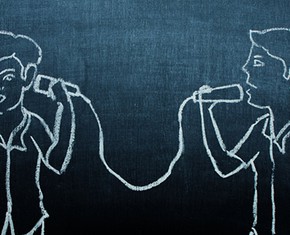The views expressed in our content reflect individual perspectives and do not represent the authoritative views of the Baha'i Faith.
When you pray, how do you do it? Do you ask God for your needs, your wants, or for forgiveness and mercy?
Christ said:
Our Father, who art in Heaven, Hallowed be Thy name. Thy kingdom come, Thy will be done, on earth as it is in Heaven. Give us this day our daily bread, and forgive us our trespasses, as we forgive those who trespass against us. Lead us not into temptation, but deliver us from evil. For Thine is the kingdom, the Power and the Glory, Forever and ever, Amen. – Matthew, 6:9-13.
Every day in my email I receive a verse passage from the Bible, and earlier this month I received the beginning of the Lord’s Prayer, which includes Christ’s admonition: “This then is how you should pray, Our Father …”
I’ve known this essential prayer since childhood, having been taught it as a young boy by my Catholic education, and hearing it every day at mass services. The Catholic version ends with “Amen” after the word “evil,” but that is the only change. (You can receive a verse a day from a dozen Bible choices by subscribing by email, free, to any number of Verse-a-Day services.)
But to say “I knew the prayer” is relative. I was too young to appreciate the words I repeated so many thousands of times in mass, elementary school catechism, and as my penance for sins committed. But the words themselves I knew and still know by rote and can recite them all in a heartbeat. They are simple words, with essentially straightforward meanings. “Father” was God in heaven, and His Name, “God,” was holy. When saying this prayer we wished for heaven to be on earth, to live peacefully, serene, with harmony among all. It is also a wish that our needs, food, clothing, shelter, a job, education, everything, be fulfilled to an ideal extent, for everyone.
“Forgive our trespasses,” was trickier, as certainly those of us saying the prayer wanted God, the Father, to forgive us, but as a Catholic going to confessional, this part of the prayer meant that the priest actually forgave our trespasses—which meant, in me, that I never had the mentality of “I forgive you” for wrongs done to me. Instead, I lashed out. I either ended up in a fistfight or cursed someone who impugned my character, or otherwise reacted angrily and impulsively, never pausing to forgive.
It wasn’t until my twenties and thirties, after becoming a Baha’i, that I realized what forgiveness meant. To me it means giving up the hurt or slight and putting it out of my memory. Also, I have to adjust my thinking, and my emotions, based on conditions I might know nothing about, like the motive of the person so-called “hurting” or dissing me.
One Baha’i verse on forgiveness, from Baha’u’llah, says:
Look not on my state, O my God, nor my failure to serve Thee, nay rather regard the oceans of Thy mercy and favors, and the things that beseem Thy glory and Thy forgiveness and befit Thy loving-kindness and bounties. Thou art, verily, the Ever-Forgiving, the Most Generous. – Prayers and Meditations by Baha’u’llah, p. 166.
For example, having driven America’s roads for over 50 years, I’ve been cut off a thousand times. At one time I would curse at the driver or HONK, HONK, HONK. Then I began thinking: Is he in a necessary hurry? Maybe she didn’t see me? Maybe he’s so preoccupied he can’t be concerned, etc. In other words, I could come up with a dozen possible excuses for the behavior. So, I realized, why get upset? I also remember the times I did it to another driver, which is sobering.
It reminds me of the old song Pack Up Your Troubles in Your Old Kit-Bag, and Smile, Smile, Smile, the full name of a World War I marching song, published in 1915 in London. It also says, “What’s the use of worrying, it never was worthwhile, so… Pack Up….” It was my favorite song when I woke up to it every morning on our AM radio alarm station in my early grade school years. I still find great wisdom in its refrains. Should I fret over the actions of another? Yes, in many ways, by standing up for virtues such as justice, equity, equality etc. and fighting injustice for another. But personally? Worry over small hurts and slights, even bigger or obvious ones? Unless they call for a positive response to correct, like a teacher corrects a student’s answer to educate them, I know I’m secure enough to weather it. The ultimate act in forgiveness is to pray for those souls who may require it, in hopes they will learn and become better persons—and to recognize one’s own faults and to pray for oneself, too.
One line of the Lord’s Prayer, “Lead us not into temptation …” is hard for anyone, we humans being imperfect, and unless we are saints we will fail tests. This line reminds me of a Baha’i prayer for unity, which states:
O my God! O my God! Unite the hearts of Thy servants, and reveal to them Thy great purpose. May they follow Thy commandments and abide in Thy law. Help them, O God, in their endeavor, and grant them strength to serve Thee. O God! Leave them not to themselves, but guide their steps by the light of Thy knowledge, and cheer their hearts by Thy love. Verily, Thou art their Helper and their Lord. – Abdu’l-Baha, Baha’i Prayers, p. 203.
These prayers for our spiritual progress, both as individuals and as one human family, have tremendous power. The Our Father, or Lord’s Prayer, is known by billions of children, youth and adults the world over. Most cultures, ethnic groups, beliefs, or creeds, and every strata of society have heard of this prayer. Millions recite it daily. It is simple and powerful, full of promise and hope for a better world, better souls, better conditions, and better relationships between people.
No judgments here—we are all equal in the sight of our Father, God.
















Comments
Sign in or create an account
Continue with Googleor